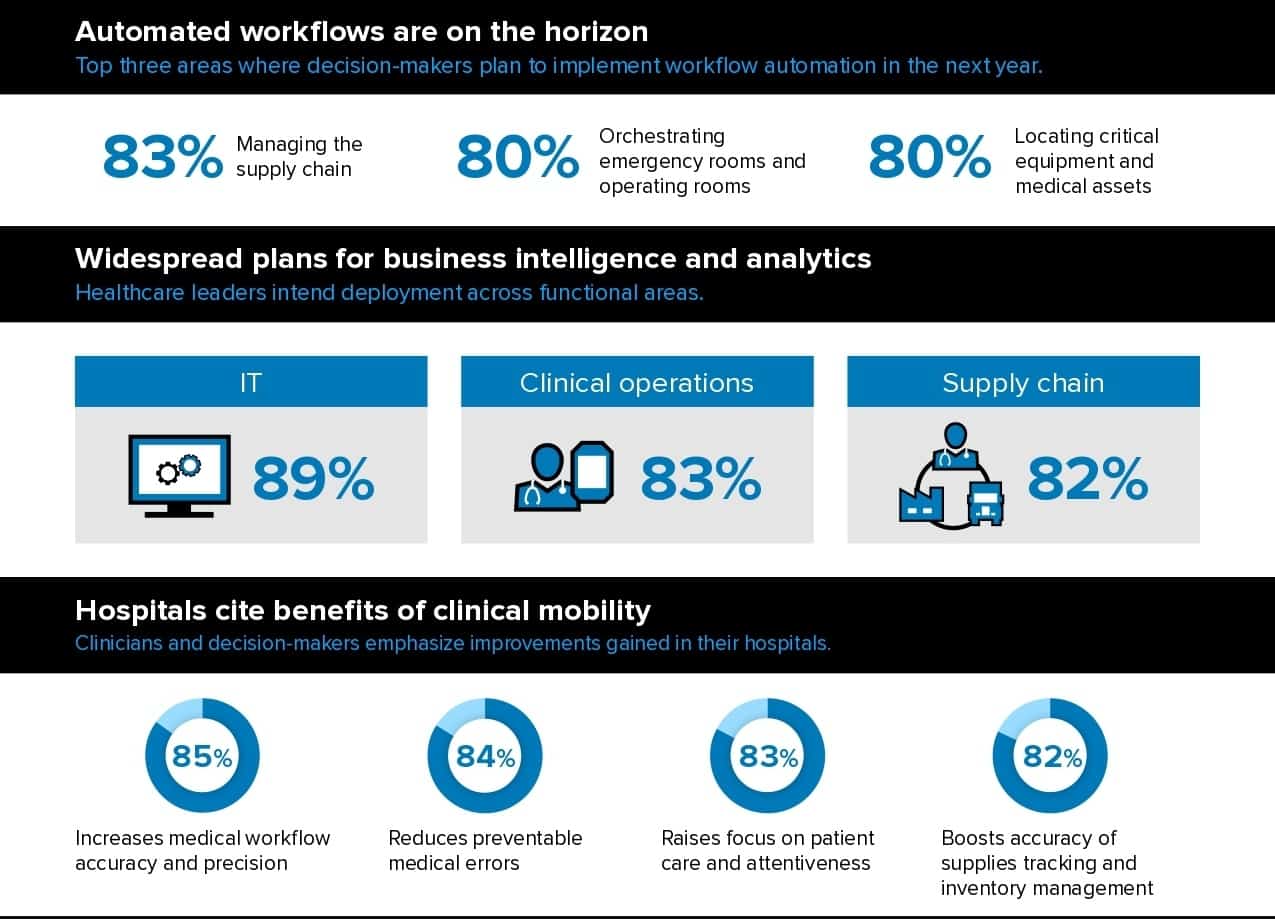Three quarters of senior executives at hospitals say they will integrate visionary solutions like Internet of Things (IoT) sensors, prescriptive analytics, and artificial intelligence (AI) to help improve both inpatient and outpatient care as the opportunities for remote physician-to-patient and clinician-to-clinician consulting grow.
Likewise, the same number of these hospital executives plan to use location technologies such as radio frequency identification (RFID) to better track equipment and specimens and improve patient flow and security. They are also turning to location solutions to create more dynamic workflows and improve staff efficiency, safety and compliance.
Furthermore, about 80% of the hospital executives plan to automate workflows in the next year to improve supply chain management, make it easier to locate critical equipment and medical assets, better orchestrate emergency rooms and operating rooms, and streamline staff scheduling.
“Location technologies and automation solutions are designed to help hospital administrators identify and eliminate workflow inefficiencies throughout the patient treatment process. Having the ability to identify, track, locate and monitor the condition of every patient, staff and asset is thus essential to improving front-line clinician workflows and providing quality patient care,” said Christanto Suryadarma, Southeast Asia (SEA) sales vice president at Zebra Technologies Asia Pacific.
Zebra Technologies yesterday released these findings from its latest healthcare vision study entitled “Smarter, More Connected Hospitals”, which polled online more than 500 senior-level hospital leaders within the clinical, IT, and procurement disciplines – with the goal of better understanding the role of technology in acute care hospitals.
All data was collected and tabulated by third-party research firm Azure Knowledge Corporation who surveyed respondents in Asia Pacific, Europe, Latin America and North America
Approximately, two-thirds of the respondents acknowledge physicians and caregivers are overextended during their shifts and spend too much time locating medical equipment and supplies. Over half report their administrative staff is equally overburdened and unable to complete their work during their shift.
With people’s safety and well-being always the top priority, hospital executives are turning to technologies such as intelligent workflow automation to help combat fatigue, reduce errors caused by manual processes and workarounds, and refocus clinicians’ time on patients.
Indeed, 89% of executive decision-makers and 83% of clinicians surveyed agree real-time intelligence is essential for optimal patient care, and hospitals are increasingly investing in clinical mobility tools, real-time location systems (RTLS) and intelligent workflow solutions to support smarter, more connected workflows. However, more than two-thirds (67%) of hospital executives still don’t feel their organizations are investing enough to maximize staff efficiency and more must be done moving forward.
“With the ongoing COVID-19 pandemic testing the resiliency of our healthcare systems here in Southeast Asia, there is now an even greater need for healthcare providers to embrace technological innovations to better support the needs of clinicians and patients,” said Suryadarma.

Purpose-built mobile devices help healthcare workers
Meanwhile, 84% of respondents believe the quality of patient care would improve if nurses, physicians and non-clinical healthcare workers had access to collaboration tools and the convenience of using their mobile devices to access healthcare applications.
This may come as a surprise considering that mobile technologies have been used in both clinical and non-clinical workflows for several years. By 2017, most bedside nurses, doctors and lab technicians were already using mobile devices, and adoption among pharmacy staff and intensive care unit nurses was on the rise. However, several acute care facilities were allowing staff to use their personal devices to connect to healthcare information systems and workflow applications at the time.
The approach to mobility is now changing. Nearly half (49%) of the surveyed executives now provide employees with hospital-owned devices intended for healthcare as more clinicians need durable and rugged devices, hospitals require more remote device management capabilities, and data security becomes a top priority. Those who have already adopted clinical mobility solutions are seeing the positive impact on the quality and cost of patient care with 8-in-ten citing an increase in medical workflow accuracy and precision as well as a reduction in preventable medical errors among other benefits.
 Most hospital executives expect to have devices deployed across nearly all staff types in the next five years.
Most hospital executives expect to have devices deployed across nearly all staff types in the next five years.
However, the focus now is on nurses assigned to emergency departments, critical and intensive care units (ICU), and operating rooms as well as those responsible for IT, supply chain/inventory management and patient transport. This is a bit of a shift from 2017, when bedside nurses and facilities management staff were being prioritized for device deployments.
“Team communication plays a key role in patient care while mitigating risks of viral transmissions and maintaining staff morale. Mobile devices are critical tools for hospitals to better manage their resources in the coming years given the increase in demand to automate the orchestration of high traffic areas in hospitals,” said Johnny Ong, APAC healthcare practice Lead, Zebra Technologies Asia Pacific.
In addition, telehealth and remote patient tracking are rising on executives’ priority lists, both of which are poised to benefit ICU and emergency room staff, and forward-thinking leaders want to start the transition from manual, reactive processes to more responsive, predictive systems in the next few years.
As a result, most procurement and IT teams are now working to equip all staff with mobility solutions that enable them to access intelligent communications and locationing tools and take full advantage of automation solutions designed to streamline workflows and improve care delivery models. In fact, just as many doctors, pharmacists, radiologists and lab technicians are expected to have a device in hand in the next two years as emergency and critical care clinicians.
“Unexpected global developments such as the COVID-19 pandemic has only accelerated the evolution of healthcare ecosystems,” added Ong. “As hospitals embrace technological innovations, they must ensure that they are plugged into the right information systems, connected to one another and work together as a cohesive ecosystem. Equipping each front-line staff with a clinical mobile device in hand is the first step in pursuing a new level of efficiency in patient care.”



